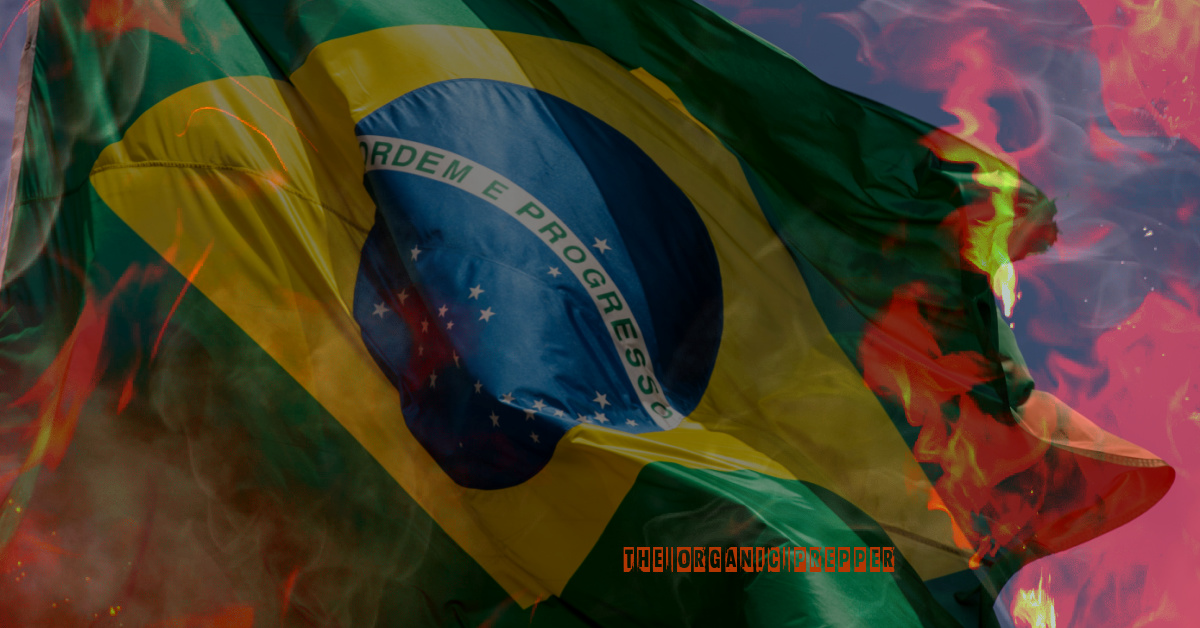Here’s How Fast Things Have Changed in Brazil Since the Election
(Psst: The FTC wants me to remind you that this website contains affiliate links. That means if you make a purchase from a link you click on, I might receive a small commission. This does not increase the price you’ll pay for that item nor does it decrease the awesomeness of the item. ~ Daisy)
By the author of Street Survivalism: A Practical Training Guide To Life In The City and The Ultimate Survival Gear Handbook
Things are declining rapidly in my country. I have no idea whether Brazil will end up like Venezuela or Argentina or if something will happen before we hit rock bottom. But since the inauguration of the “new old” leftist government of populist president Lula, it’s one bad news after another in politics, economy, freedom, and liberty.
Less than two months into his term, Lula hasn’t made clear his plans to advance the agenda for the good of the country. He’s more invested in passing the buck, pushing his retrograde and divisive discourse, advancing ideological alliances, and promoting unorthodox initiatives and policies. In other words, everything that has failed miserably in the not-so-distant past.
Not to mention the scandals already popping up. When you add the promotion of wokeism and authoritarianism, the complacency of the congress, the collusion of the press, and the polarization of civil society, the future looks gloomier today than even during the worse of the pandemic. If things keep going this way, Brazil is about to become less developing and more Third World.
Too early for that kind of crap.
It was promised that the end of Bolsonaro would bring peace and union, but instead, this has been quite a tumultuous and ominous start for Lula so far. The boondoggle is furthering radicalization, spreading concern among investors, and destabilizing the market.
Shouldn’t a new government enjoy a honeymoon period? Except this government isn’t new: we’ve seen the names, misconducts, scandals, and failed ideas before. Lula’s Workers Party governed Brazil between 2003 and 2016, but accepts no responsibility for the current situation, even declaring it will “fix everything” in the next four years.
After the most polarized, disputed, and controversial elections in decades, few have much tolerance for the cheap populism and blatant nonsense, including many of Lula’s supporters. There’s just so much to do in the face of the ongoing global crisis, yet the president is still acting like he’s campaigning.
Practical developments of destructive policies take time to manifest in the street economy and the quotidian.
That’s the dynamic of things, even in the current unfavorable environment. It doesn’t hit the fan immediately or suddenly. Furthermore, Brazil is not isolated, meaning the global market will largely influence whether things go in one direction or another here, too (not that this is cause for optimism, just saying).
However, the escalating attacks on rights and freedom and the disregard for the Constitution by the government and a hyperactive Supreme Court are already impacting society and affecting the economy. One example is the crackdown on gun rights.
Lula signed a mandate on inauguration day suspending the issuing of new licenses and registers, effectively stopping the commerce of firearms and ammunitions dead in its tracks. The sector currently employs more than 3 million people and represents 5% of Brazil’s GDP. Investments have been put on hold, and layoffs and closures already started.
A major red flag
An ordinance mandates every gun purchased after May 2019 to be registered along with the owner’s personal information on the Federal Police database until March 30th. Failure to comply renders the offender subject to search and apprehension, among other administrative and legal proceedings.
Every gun sold to citizens is already registered either in the Army’s SIGMA or the Federal Police’s SINARM systems (depending on which category your license falls under, or the system you opted to register the firearm at purchase). Now everyone and their guns have to go into this newly created database.
The declared objective is creating a unified and up-to-date directory, but many believe it’s a setup. The Federal Police – the Brazilian equivalent of the FBI – is a more subordinate autarchy than the military. That makes it considerably easier for the government to come after people’s guns in the future.
Those who think this is a conspiracy theory should look at what’s happening in Myanmar, where “the junta has revived a 1977 law that allows civilians it deems “loyal to the state” to own firearms, a move experts worry will escalate violence by arming pro-junta groups fighting armed resistance groups opposed to military rule.” [SOURCE]
No jab, no money
Social credit scores are coming via the hijack of Brazil’s largest social welfare program, the Bolsa Familia. Lula declared his intention to suspend the benefit for the unvaxxed individuals and families, all of whom are low or very low income.
Arm-twisting tactics such as these are being normalized everywhere, but they tend to be more effective in countries with severe and lingering deficiencies and deprived populations. Socialist regimes maintain people in poverty and ignorance to keep them dependent and thus more pliable and obedient.
Political persecution
More than 1.500 were arrested following the events of January 8th I described in a previous article. Almost two-thirds are still being held for “further investigation” based on alleged involvement in “terrorist acts”, despite not participating in the invasion and depredation of the buildings in the capital Brasilia.
The imprisonment of innocent citizens without due process is a violation of the Brazilian constitution. It’s extremely unsettling; however, it’s being whitewashed by the media, ignored by the politicians and civil defense organizations, and applauded by a significant part of society – who bought into the narrative and remain oblivious to the dangers of the precedent.
Censorship
The Supreme Court keeps interfering with the executive and overstepping the legislative, with justices continually showing a frightening disregard for the Constitution, allegedly to “defend democracy” and counter “extremism.” As a way to legitimate the crackdown on the opposition and dissenting media, some sectors keep pushing the narrative that Brazil is on the verge of a coup and obvious BS.
Unsurprisingly, Lula is now calling for a de-escalation of juridical interference. He wants to “pacify the institutions” and “bring back the balance of the powers”, but it was precisely the abuse of these tactics by the opposition during Bolsonaro’s term that propped the courts in great part. Now they want the genie back on the bottle, but the justices are having none of it.
The scandals are back
Bolsonaro and his secretaries had their misconducts. However, the past of widespread, institutionalized corruption still cast a heavy shadow on Lula and various members of his cabinet. Only one month and the skeletons are already coming out of the closet, with allegations of secretaries involved in corruption and other misconducts.
The president seems unfazed, constantly resorting to deflection and counterattacks in his typical swagger instead of acting to contain the crisis. The subservient media is still fixed on the former government’s sins and not even minimally interested in investigating the allegations.
Tell me who your friends are, and I will tell you who you are
The old ambition to establish Brazil as a regional leader is back, too. Lula’s allies (presidents and dictators of failed socialist Latin American nations) are being courted by promises of funding and partnerships in exotic infrastructure projects. Most of these countries owe billions in loans to Brazil.
At the same time, he’s cutting back on agricultural, research, and education programs, and promoting the creation of a common currency with Argentina “to facilitate trading between neighbors” – a megalomaniac idea that has failed every single time in the past with catastrophic consequences. As bad as it may be, it’s impossible to conciliate Brazil’s fiscal and economical situation with Argentina’s disarray and three-digit inflation.
But it will march on because that allows the misappropriation of taxpayer’s money that contributes to the left’s populist and power-grabbing plans. Those are the actual reasons these things keep being proposed by Lula and his party.
Every choice is a thousand renunciations
The support that civil society shows for all the crap presented here is worrying, to say the least. It’s not a vocal minority but a large part of the population and the subservient, corrupt media. Polarization is so extreme that there’s no common ground anymore, not even an open debate.
It may sound like I’m bashing the just-inaugurated government because I’m pro-right. I have no political affiliations, and to be honest, I don’t think the situation would be that much different if Bolsonaro had been elected instead of Lula. The left is incompetent, tyrannical, and evil, yes. But people voted believing this time it’s different, so here we go again.
Just another story of how fast things can change
One day it’s going in one direction; the next, changes come fast and from all sides. How can anyone consider investing long-term in a place where rules and regulations have no stability? They can’t, and that’s why foreign and domestic investors are holding or even pulling their plans.
The global economy is slowing down, and the actions of the new government will accelerate things in Brazil. Layoffs are already being announced. Less investment and jobs: I know what comes next, and it’s not good. There’s chaos building in the background, and social cohesion undoing already.
I wish I could be optimistic about the future of my country
Realistically, though, the history of incompetence, short-sightedness, and arrogant authoritarianism of our “new old” government doesn’t leave much space for hope. The people in charge and the retrograde ideas smell outdated and rotten, and that’s frightful.
In all fairness, something similar is happening everywhere. Leadership is mediocre, and people are lost. It’s a global phenomenon. But as I say, it’s always worse in countries with immoral elites, inconsistent, weak, and corrupt institutions, spineless press, and a deprived, easily manipulated population.
Despite the mess, it’s still early in the doom cycle, so I’m ramping up my preparations once again. But it’s time to keep options open, so I’ve started working on Plan B in parallel. We never know.
Are you surprised about how quickly these changes were implemented? Do you worry about something similar occurring in your country? How much further do you think Brazil will decline under the current leadership? Share your thoughts in the comments.
About Fabian
Fabian Ommar is a 50-year-old middle-class worker living in São Paulo, Brazil. Far from being the super-tactical or highly trained military survivor type, he is the average joe who since his youth has been involved with self-reliance and outdoor activities and the practical side of balancing life between a big city and rural/wilderness settings. Since the 2008 world economic crisis, he has been training and helping others in his area to become better prepared for the “constant, slow-burning SHTF” of living in a 3rd world country.
Fabian’s ebook, Street Survivalism: A Practical Training Guide To Life In The City , is a practical training method for common city dwellers based on the lifestyle of the homeless (real-life survivors) to be more psychologically, mentally, and physically prepared to deal with the harsh reality of the streets during normal or difficult times. He’s also the author of The Ultimate Survival Gear Handbook.
You can follow Fabian on Instagram @stoicsurvivor
Please Support Our Sponsors
Solar Power Generator Discounts Along With Free Shipping
- 10% OFF for Jackery Solar Generator 2000 Pro Series with code "JADEAL"
- 10% OFF for Jackery SolarSaga 200W Solar Panel with code "JADEAL"
- 10% OFF for Jackery Solar Generator 1500 Series with code "JADEAL"
- 10% OFF for Jackery Solar Generator 1000 Series with code "JADEAL"
- 10% OFF for Jackery Explorer 1500 Portable Power Station with code "JADEAL"
- 10% OFF for Jackery Explorer 1000 Pro Portable Power Station with code "JADEAL"
- 10% OFF for Jackery Explorer 500 Pro Portable Power Station with code "JADEAL"
- 10% OFF for Jackery Explorer 300 Pro Portable Power Station with code "JADEAL"
- 10% OFF for Jackery SolarSaga 100W Solar Panel with code "JADEAL"

The University of Georgia is represented by the Georgia Bulldogs . The Bulldogs participate in the Southeastern Conference's (SEC) Eastern Division of the NCAA.
They play their home games in the storied Sanford Stadium in Athens, Georgia. The first season in Georgia was in 1892. In 1942, 1980, and 2021, the Georgia Bulldogs won three national championships.
The Georgia Bulldogs have additionally been crowned the National Champion in four additional seasons by at least one polling organization (1920, 1927, 1946 and 1968).
The Georgia Bulldogs are tied for second place in conference history with their 15 conference titles, including 13 SEC titles, and their 59 bowl appearances, which ranks second all-time.
In addition, the program has produced five top picks in the National Football League (NFL) draft, two Heisman Trophy winners, numerous winners of various national honors, and many others.

Longhorns football represents the University of Texas in Austin often known as Texas, UT or the Texas Longhorns. The Longhorns represent the Big 12 Conference in the NCAA Division. They play in Austin, Texas, at the Darrell K. Royal-Texas Memorial Stadium.
The Texas Longhorns are ranked third and seventh, respectively, in terms of all-time wins and win-loss records, with over 900 victories and an overall win-loss percentage of.705.
The legendary program also boasts four national titles, 32 conference titles, 100 First Team All-Americans, and two Heisman Trophy winners.
Get your Texas Longhorns Revival T-Shirt today. The Texas Longhorns Rustic Revival shirt is also a fan favorite.
Many college sports fans like to wear their gear all around town, get your Texas Longhorns Centered gear and show your support.





 Gettr
Gettr














